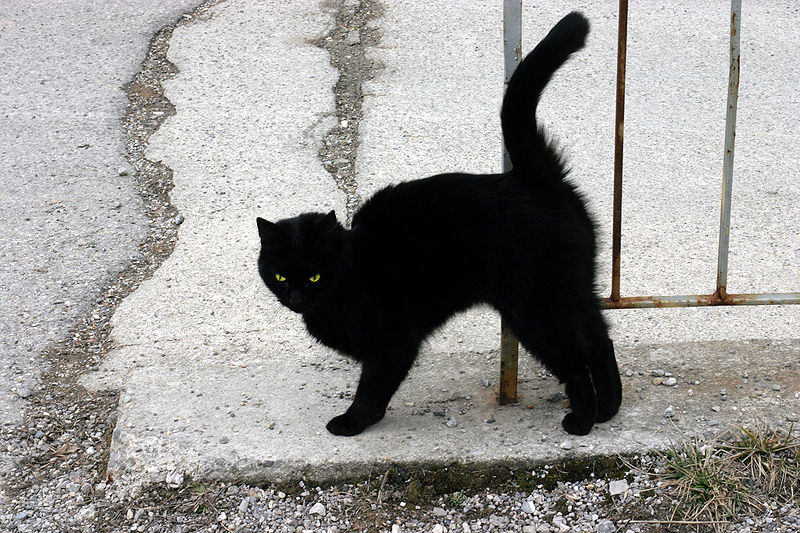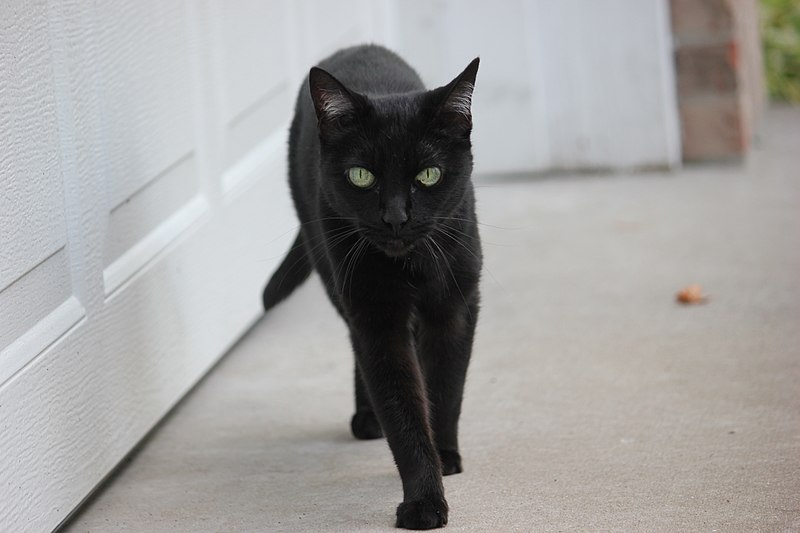Myth Monday: Why is a Black Cat Crossing Your Path Bad Luck? (Superstitions)
By Kara Newcastle
“A black cat crossing your path signifies that the animal is going somewhere.”
-Groucho Marx
Imagine you’re taking a nice leisurely stroll on a bright sunny day. You’re in a great mood. Everything is right in the world, you have no worries, no problems …
And then without warning, a black cat darts across the sidewalk in front of you. It doesn’t even spare you a glance as it trots by and vanishes under a shrub, but now you find yourself frozen in place. Your jaw drops and a chill riddles its way down your spine as you struggle to wrap your mind around what just happened.
A black cat crossed your path—now you’ve been cursed with bad luck!
Okay … but why? It’s just a black kitty cat that happened to walk past you. If it means bad luck, it should only be for whatever rodent it chances upon, not you.
So why are you so freaked out?
Cats in general and black cats in particular have a hand a long and complicated relationship with humans. In Ancient Egypt, cats were sacred, believed to be protectors of the home and the people within. The sun god Ra turned into a cat every night to fight the apocalypse snake Apophis, and the goddess of happiness was the extremely popular, cat-headed woman Bastet (see my blog on her here!) The Egyptians loved their cats so much that if someone killed a cat they would be condemned to death, and it was said that the Egyptians were conquered by the Persian king Cambyses II after he ordered his soldiers to paint cats on their shields and carry live cats into battle with them. The Egyptians were so afraid of harming the cats that they surrendered.
Lately, I’ve found many online blogs and articles that claim that black cats were especially holy in Ancient Egypt because Bastet herself was a black cat. I find that claim iffy mythologically speaking, since I’ve never found any myth mentioning that specifically. However, there are many statues of Bastet in cat-form that were carved out of black basalt, so that might be where that connection comes from.
The worship of Bastet had spread into Rome, and was a popular religion for hundreds of years, eventually going head-to-head with early Christian sects. At first the Christians were fairly unconcerned with Bastet, but as their own popularity grew and members became fanatical, many primitive church leaders began to claim that worshiping deities like Bastet was evil, that she was a servant of Satan and had to be destroyed. That attitude extended to the hundreds of cats that lived pampered lives in the temples, and when the cult of Bastet died (and it died hard), it became open season on cats. Black cats were probably especially targeted since so many of Bastet’s statues were of a black cat.
Gradually memory of Bastet died out and people became mostly disinterested in cats, regarding them as at best a farm animal and at worst little better than the rats they hunted. It was not uncommon to see dozens milling around a farmstead in the country, picking off the abundance of rodents that would chew their way through a family’s food stores. Since most men worked in the field and most women stayed to care for the home, cats became more accustomed to women.
Unfortunately, this spelled disaster for both women and cats; from the mid-1400s until the late 18th century, a combination of civil unrest, economic failure, epidemic, famine and religious fanaticism gave birth to the horrifying witch hunts. Fearful and uneducated people looked for scapegoats to pin their troubles on, and all too frequently blame fell on women. The women were targeted for any number of reasons—being too opinionated, outliving too many husbands, living long past the age when most people would have died, having knowledge of medicinal herbs, living alone, being disfigured—and the accusations of witchcraft spread to their cats.
According to the witch hunters, a witch was a person who sold their soul to the Devil. In return, the fiend granted his new servants magical powers, and a monstrous assistant known as a familiar. A familiar was a demon, but it had the power to transform itself to look like an ordinary animal and then go out to help the witch commit crimes against her neighbors. With all the cats on a woman’s farm, it was easy to assume that they could be demons in disguise. Witches were also thought to be able to transform themselves into animals, and more often than not that animal was a black cat.
It wasn’t long before the hunters’ half-assed, biased research found tales of black Bastet. Additionally, the Greek goddess Artemis her Roman counterpart Diana, both associated with witchcraft, could turn themselves into black cats (this is probably where the idea that human witches could turn themselves into cats came from.) The Greek goddess of magic Hecate was said to keep black cats, and the Viking goddess Freya was not only a goddess of love, but also of war and magic, and rode in a chariot pulled by cats (it’s interesting to note that the Vikings loved their fluffy skogskatt, but a few hundred years later their descendants were murdering them in droves.) Furthermore, both the Scots and the Irish had legends of the malicious fairy cat Cat Sith (read the blog here and its most famous story here!) that was almost entirely black. The Scots also believed that one could summon a demon in the form of a huge black cat.
This did not help cats at all.
Which brings us back to the topic at hand: why is it bad luck for a black cat to cross your path? Because the black cat might be a witch or a witch’s familiar, of course. Fear of black cats and witches became so bad that many people would have panic attacks at the mere sight of a black cat, thinking that it had come to do them harm. That cat crossed your path, cutting you off short … it might have just cut off the rest of your life right there.
It’s very symbolic and very full of crap.
By the time the plagues ended, cats were welcomed back into cities and town, albeit somewhat cautiously—though science was fast replacing superstition, many people had grown up with fears of witches and their feline sidekicks, and the superstitions remained. Not only did they remain, but they also traveled; the Puritans brought their distrust of black cats to the New World, and in the Salem witch trials, the afflicted claimed that they could see spectral cats, and the accused trying to escape death made up stories of devilish felines.

Now, some of you might be wondering that if a black cat crosses your path and it means bad luck, would a white cat crossing your path mean good luck? Yes—depending on where you live. For reasons I’ve yet to find out, in America it’s believed by some that a black cat crossing your path is bad luck and a white cat crossing your path is good. In England the opposite is true: the white cat is bad and the black cat is good. An Irish belief states that it’s bad luck for a black cat for a black cat to cross your path in the moonlight—this means you will die in an epidemic (Ireland? Any recent reports on this?) And the Germans like to complicate it further by stating if a black cat crosses your path from left to right it’s good luck, but right to left is bad luck.
And other cultures say that if the cat is walking to you, then it’s bringing you good luck. If it walks away from you, then it’s taking the good with it.
Naturally, this is all a load of dirty litter. Me myself, I’m happy to see a black cat cross my path. About four years ago, I was on vacation on Cape Cod, walking along a sidewalk in Hyannis when a black cat suddenly sauntered across my path. I stopped and screamed, “KITTY!!!!” in delight. The cat took one look at me and ran off in terror.
It made me wonder if cats have a similar superstition about us?




